Howard Andrew Jones's Blog, page 48
February 27, 2015
Lord Dunsany Re-Read: Time and the Gods, Part 9
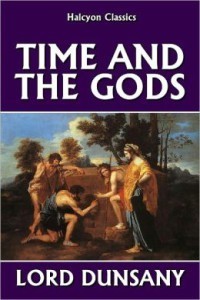 Bill Ward and I finished our Lord Dunsany re-read with the last four stories published in the original Time and the Gods (not the omnibus). You can find a free copy of the book here and join in the discussion. Our rating system is pretty simple. One star is a standout, and two stars is truly notable. Most of Lord Dunsany’s fantasy work is already fairly remarkable, so even a “no star” story on this scale may be worth a look. This week we read “The Relenting of Sarnidac,” “The Jest of the Gods,” The Dreams of a Prophet,” and “The Journey of the King.”
Bill Ward and I finished our Lord Dunsany re-read with the last four stories published in the original Time and the Gods (not the omnibus). You can find a free copy of the book here and join in the discussion. Our rating system is pretty simple. One star is a standout, and two stars is truly notable. Most of Lord Dunsany’s fantasy work is already fairly remarkable, so even a “no star” story on this scale may be worth a look. This week we read “The Relenting of Sarnidac,” “The Jest of the Gods,” The Dreams of a Prophet,” and “The Journey of the King.”
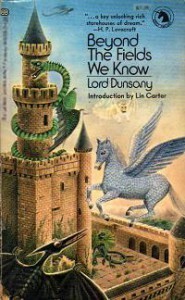 Howard: This was my least favorite stack of selections from the entire book. As a matter of fact, I was so disappointed in the first three stories that I pushed on to finish the one we’d originally slated for next week, “The Journey of the King.” That I found excellent, and two star worthy. The others, not so much.
Howard: This was my least favorite stack of selections from the entire book. As a matter of fact, I was so disappointed in the first three stories that I pushed on to finish the one we’d originally slated for next week, “The Journey of the King.” That I found excellent, and two star worthy. The others, not so much.
“The Relenting of Sarnidac” was probably the best of the three we’d planned to read, but I thought it was an interesting experiment that wasn’t quite carried off. While I felt for Sarnidac the story would have been more interesting if, as is usual in a Lord Dunsany story, we weren’t kept at arm’s length from an actual character.
I’d completely forgotten what “The Jest of the Gods” was even about until I revisited it to write this essay, which ought to be a warning sign right there. It’s a revisiting of the themes of gods interfering in the life of a mortal, but it’s hardly top drawer Lord Dunsany.
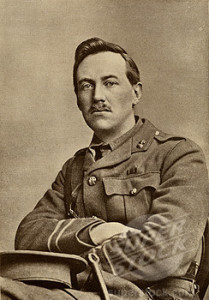 Lastly was “The Dreams of a Prophet” which was probably the best realized and most thoughtful of these three, and gave us the memorable scene where Fate and Chance play over a chessboard.
Lastly was “The Dreams of a Prophet” which was probably the best realized and most thoughtful of these three, and gave us the memorable scene where Fate and Chance play over a chessboard.
Yet none of these can compare with “The Journey of the King,” which is masterful. It’s far and away the longest tale in this collection.
I don’t think anyone else could have carried off a story like this, where one by one various prophets come to the king and discuss visions of the afterlife and promises of what may lie beyond. Nearly every sentence sits bejeweled with stunning imagery, all to the service of Dunsany’s peerless imagination. He invents an entire panoply of mythical traditions that read as if they’re a part of some real culture we’ve never heard of.
I discovered that if I pressed on and kept reading it felt a little repetitious, and that I could better appreciate the beauty if I read it in smaller doses. It’s rich details could be overwhelming. In the end “The Journey of the King” was brilliant, and a wonderful conclusion to the volume, especially after a number of tales in the back half of the book ended up rather lackluster.
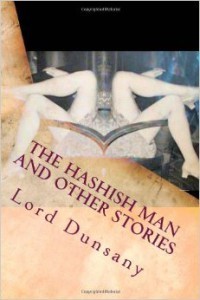 As much as I’m tempted to press on into the next Lord Dunsany collection and read some of the greats – like “The Sword of Welleran” and “The Fortress Unvanquishable, Save for Sacnoth” – it will be a pleasure to read some prose in a completely different style.
As much as I’m tempted to press on into the next Lord Dunsany collection and read some of the greats – like “The Sword of Welleran” and “The Fortress Unvanquishable, Save for Sacnoth” – it will be a pleasure to read some prose in a completely different style.
Bill: I once again find myself in accord with your sentiments, Howard. I found the three shorts in this week’s selection fairly weak, whereas the novella was excellent. It also made a strong end to the collection.
All of these stories once again showcase Dunsany’s and the collection’s great themes of time and loss, and it feels appropriate to situate them here, as they either directly incorporate the actual departure of the gods, like “Sarnidac” or “Jest,” or else they deal again with the notion of an eventual doom of the gods, an unknowable end of everything, first mentioned in “The Sorrow of Search” — indeed, you could say “The Journey of the King” is a reprisal of “Sorrow,” and an even more effective use of the general premise of the King soliciting wisdom from various prophets than the earlier story.
 “Sarnidac” and “Jest” feel like a set in a way, in one a misshapen man only experiences pity because of the departure of the gods from the world, and in the other a man’s own defiance is enough to eradicate the gods. Both remind me that Dunsany is working to a theme, probably producing many of these stories quickly to fill a volume, and of course some of his ideas prove to be somewhat slighter than others. I hesitate to call these tales “filler,” but even Dunsanian filler is some quality, interesting stuff.
“Sarnidac” and “Jest” feel like a set in a way, in one a misshapen man only experiences pity because of the departure of the gods from the world, and in the other a man’s own defiance is enough to eradicate the gods. Both remind me that Dunsany is working to a theme, probably producing many of these stories quickly to fill a volume, and of course some of his ideas prove to be somewhat slighter than others. I hesitate to call these tales “filler,” but even Dunsanian filler is some quality, interesting stuff.
“The Journey of the King” was a real pleasure, though, and a great way to end the collection. This story could easily be published on it’s own, it would make a terrific chap book (if it hasn’t already been). Great simple structure of multiple fabulous conceptions of the afterlife and existence piled one upon another, each one feeling both rooted in a world we know and yet wholly original to Dunsany. His powers of invention here are at full blast, and I say this story easily stands as one of the best, and one of the most illustrative of Dunsany’s style and voice, that I have read.
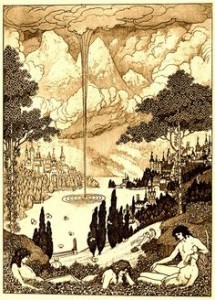 Stand outs for me would be one prophet’s description of how eternal life and youth would be a curse — a most poetic and insightful a meditation on this not uncommon notion. Another fresh characterization of time, here appearing as a ‘nimble swordsman’ cutting down each hour as it passes. He is also the rebellious slave as described in the first story, “Time & the Gods” — and he may also be the mysterious stranger that gives the story its strong ending.
Stand outs for me would be one prophet’s description of how eternal life and youth would be a curse — a most poetic and insightful a meditation on this not uncommon notion. Another fresh characterization of time, here appearing as a ‘nimble swordsman’ cutting down each hour as it passes. He is also the rebellious slave as described in the first story, “Time & the Gods” — and he may also be the mysterious stranger that gives the story its strong ending.
And its the ending that elevates an already great story into a classic one, and “The Journey of the King” communicates it’s idea of an unknowable, ultimate, indescribable end to all things in a more effective way than did “The Sorrow of Search.”
I also share your conclusion that no one else could really write a story like this, at least not well. It takes all of the strengths of the best stories in this volume and ends with them all guns blazing, which feels like a bit of a relief after the rather faint impressions some of the stories in the second half of the book were having on us. Perhaps we’ll have more to say about that when we sum things up next week — but I am with you in looking forward to a change of pace.
Howard: Next week, a wrap-up and a look ahead at Fritz Leiber’s Swords Against Death.
February 24, 2015
Winter Madness
 It’s been a crazy few days. I slid into my wife’s car with my truck, darn it, and then drove about five hours through a snow storm, white knuckle all the way, to get my first born to a college audition of sorts. Fortunately it went well and the roads on the way back were a lot better. (Tomorrow I take the car in for repair — I wasn’t going very fast, and the truck wasn’t hurt, but the car bumper is shot. I miss steel bumpers. Really, what’s the point of a fiberglass bumper?)
It’s been a crazy few days. I slid into my wife’s car with my truck, darn it, and then drove about five hours through a snow storm, white knuckle all the way, to get my first born to a college audition of sorts. Fortunately it went well and the roads on the way back were a lot better. (Tomorrow I take the car in for repair — I wasn’t going very fast, and the truck wasn’t hurt, but the car bumper is shot. I miss steel bumpers. Really, what’s the point of a fiberglass bumper?)
I wasn’t able to post Monday because a tree branch took out our internet, cable, and phone. Next Monday, though, Chris Hocking and I are bringing back Hardboiled Monday, and Friday Bill and I will try to wrap up our Lord Dunsany read.
In other news, I’ve become a TOR author. Paizo Pathfinder novels are now going to be distributed through TOR, and the publishing schedule means that my upcoming book will be the third one released under the joint banner.
My novel revisions are going very well and I’ve got a few other projects on the front burner now that are starting to simmer. I hope to be able to talk about all of it in just a little bit, and talk a little more about some writing strategies I’ve been using on my newest work.
February 20, 2015
Lord Dunsany Re-Read: Time and the Gods, Part 8
 Bill Ward and I are continuing our Lord Dunsany re-read with the next two stories published in the original Time and the Gods (not the omnibus). You can find a free copy of the book here and join in the discussion. Our rating system is pretty simple. One star is a standout, and two stars is truly notable. Most of Lord Dunsany’s fantasy work is already fairly remarkable, so even a “no star” story on this scale may be worth a look. This week we read “The South Wind” and “The Land of Time.”
Bill Ward and I are continuing our Lord Dunsany re-read with the next two stories published in the original Time and the Gods (not the omnibus). You can find a free copy of the book here and join in the discussion. Our rating system is pretty simple. One star is a standout, and two stars is truly notable. Most of Lord Dunsany’s fantasy work is already fairly remarkable, so even a “no star” story on this scale may be worth a look. This week we read “The South Wind” and “The Land of Time.”
 Howard: This week’s first story was another reminder of just how wonderful Lord Dunsany could be. I awarded one star to “The South Wind.” What a dark and fabulous little origin story for the lonely South Wind, brimming over with all the casual use of wonderful imagery and ideas that is Lord Dunsany at his best.
Howard: This week’s first story was another reminder of just how wonderful Lord Dunsany could be. I awarded one star to “The South Wind.” What a dark and fabulous little origin story for the lonely South Wind, brimming over with all the casual use of wonderful imagery and ideas that is Lord Dunsany at his best.
Bill: I would give both stories a star, maybe a half star for “The Land of Time.” “The South Wind” edges that out for me as well. A great concept, the idea of the lonely, ever hungry South Wind being the tormented soul of a man punished by the gods for learning that they are not all powerful. This story, and the game between Fate and Chance, hint at the eventual end of the gods, something that ties back in with the earliest stories.
Howard: “The Land of Time” starts strong and shows us all sorts of wonderful imagery. Once it really gets going, though, any long time reader of Lord Dunsany can see where it’s headed and it’s just a matter of reading along to watch it happen. We’ve read several of these “king leads armies on futile pursuit and it ends up in DOOM” tales and I suppose there may be others in the Dunsany catalog as well. Again I’m wondering if I’m just too jaded to appreciate this one as much and if I would love it if I came upon it never having read Dunsany before.
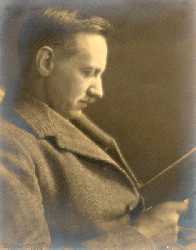
Lord Dunsany
Bill: “The Land of Time” prefigures “Carcassone” especially and a few other Dunsanian quest stories. Here again is Dunsany’s great theme, but it is literally a war against time that is of concern to our protagonist King, rather than just the subtext of the tale. The King’s earliest exposure to the ravages of time (disused temple, old people, etc) is very reminiscent of the Buddhist legend where the sheltered prince Siddhartha, the future Buddha, comes into contact with the suffering of the world for the first time. The army throwing itself against the ramparts of the city of time, only to age into infirmity before they get there, and then, of course, to find there home changed completely by time when they return, are the predictable but nonetheless narratively satisfying results of the quest.
I think if we hadn’t just read essentially the same story with a more subtle edge in Carcassone it would have seemed less predictable.
Howard: I think you’re right, and that I’m starting to suffer from a little Dunsany fatigue. Alas. Well, two more weeks, and then we can dive into Swords Against Death. Next week, three stories, and then the final week, the last and longest tale from Time and the Gods. I remember being especially impressed with it from twenty years ago. It will be interesting to read it and see what I think now.
February 16, 2015
Writing Updates
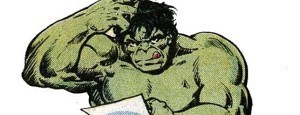 I’m still learning, and that’s good. It means I’m not dead.
I’m still learning, and that’s good. It means I’m not dead.
Yes, my new outlining method has really helped speed my writing process along, but I’ve still ended up with sections I didn’t need after having fleshed them out from the outline phase. I have to update my list of writing mistakes.
I’ll be adding several things.
Don’t make things too complicated. A sprawling cast may work great for some but I need to keep my sprawl to a minimum. I prefer writing a fast pace that picks up steam and continues to build. I think my work is at its best when I play to strengths. So — less sprawl.
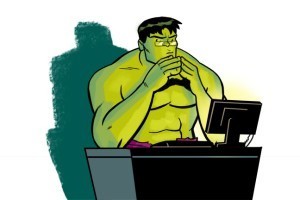 Stop taking on too many projects. I keep thinking that because I’ve gotten wiser about this writing stuff that I can turn into a prose machine and crank stories out that are in top form by second draft. I’m currently in the midst of four projects with the potential for a short fifth looming. That’s three too many. I need downtime or all the writing suffers. Right now I’m trying to invigorate various projects by shifting between them, which is good and bad.
Stop taking on too many projects. I keep thinking that because I’ve gotten wiser about this writing stuff that I can turn into a prose machine and crank stories out that are in top form by second draft. I’m currently in the midst of four projects with the potential for a short fifth looming. That’s three too many. I need downtime or all the writing suffers. Right now I’m trying to invigorate various projects by shifting between them, which is good and bad.
I’m going to underline two earlier entries from my list of writing mistakes so I’m ultra sure I pay attention to them. As always, I need to make sure I know what every character wants before I write the scene. Also, I need to be in my character’s head and see through his/her eyes. I ran into problems with my Paizo novels, written with such glee last summer, because of these two issues, particularly the second. Yes, I was able to draft them quickly because I stayed to an outline that mostly worked. Yet changes had to be made. While they weren’t plot level edits (thanks to the outline, the structure was quite solid) once I had the dialogue in place I didn’t do a very good job of getting into many of the characters’ heads until another month or two of passes.
 It turns out that’s one of the bugs of my outlining method. If I’m used to knowing what the characters’ motivations are and am used to seeing the text as bare description with dialogue (as with a play), I can fool myself into thinking that everyone else who sees the prose will be on the “same page.” And that’s not necessarily true. I’m writing adventure stories, so the intent has to be clear. I have to make sure that not only can I see where I’m going when I’m driving down the plot lines, but that the readers will be intrigued as well.
It turns out that’s one of the bugs of my outlining method. If I’m used to knowing what the characters’ motivations are and am used to seeing the text as bare description with dialogue (as with a play), I can fool myself into thinking that everyone else who sees the prose will be on the “same page.” And that’s not necessarily true. I’m writing adventure stories, so the intent has to be clear. I have to make sure that not only can I see where I’m going when I’m driving down the plot lines, but that the readers will be intrigued as well.
The other main bug to the outline method I’m using is that I can get attached to ideas and characters that are interesting in concept but don’t add to the overall pacing. For what I want, Pacing is an essential ingredient, and I shouldn’t get distracted by pretty lights. Instead of wording the mistake as Don’t make things too complicated as I did above, perhaps it should be Keep things streamlined.
Off topic, Chris Hocking and I will be bringing back Hardboiled Mondays as an occasional feature, perhaps once or twice a month. I think every Monday being hardboiled was starting to burn us out and perhaps wear thin for site visitors.
February 13, 2015
Back Soon
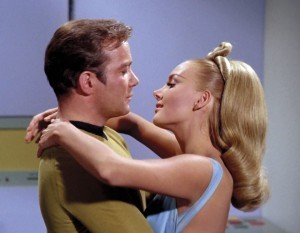 Bill and I will return next week to start on the final leg of Lord Dunsany’s Time and The Gods anthology. There are only six left, and then we’ll be turning to the first fantasy book I ever read, Swords Against Death.
Bill and I will return next week to start on the final leg of Lord Dunsany’s Time and The Gods anthology. There are only six left, and then we’ll be turning to the first fantasy book I ever read, Swords Against Death.
This weekend my lady and I (pictured on the left) will be spending some quality time together. May you all be so fortunate.
In other news, I just learned I got the most votes in Black Gate‘s “who should write in the Cthulhu mythos today” contest. That was pretty cool, and totally unexpected. I suppose that Dabir and Asim DO face off against lots of weird menaces. I approach horror more like REH did most of the time, though, like an ingredient to season a story rather than the entire focus of one.
This surprising win does have me thinking about whether I should try to tackle writing some horror straight on, although it will have to take a back seat to the various projects I’ve already got cooking.
February 11, 2015
Link Man Returns
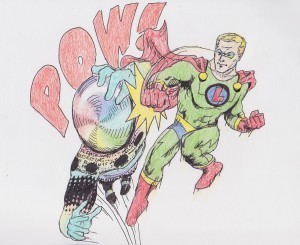
Why it’s Link Man, defender of safe, interesting, and quick loading internet content! And he’s here to stop the menace of The Spinner!
Regular visitors to the site know by now that long periods of quiet indicate lots of activity behind the scenes. I wish YOU could see what I’ve been writing, but it’s still going to be quite a while before any of the books I’ve worked on will appear in print. Still, they’re coming. I’m deep in editing/revision mode on the cleanup pass of For the Killing of Kings, giving more time to the character my handful of readers have named their favorite.
Today I’ll just ask Linkman to provide us with interesting and safe places to visit..
 First, Star Trek Continues is only five days out from the conclusion of their Kickstarter, or Kirkstarter 2.0. I’ve raved about this show before, and if you’ve followed my previous posts and checked out their episodes, perhaps you’ll understand why. They’re only a few thousand dollars out from getting enough money to build their engine room set, so I’m hoping a few more people will chip in. What I REALLY hope is that SciFi or someone will give them the wherewithal to do this full time, but I guess that’s a pipe dream. So I suppose I will settle for them continuing to donate their spare time and energy and talent to make these amazingly faithful episodes, which means they need OUR help. (After the engine room gets funding, their next goal is a planet set, which I would likewise love to see!)
First, Star Trek Continues is only five days out from the conclusion of their Kickstarter, or Kirkstarter 2.0. I’ve raved about this show before, and if you’ve followed my previous posts and checked out their episodes, perhaps you’ll understand why. They’re only a few thousand dollars out from getting enough money to build their engine room set, so I’m hoping a few more people will chip in. What I REALLY hope is that SciFi or someone will give them the wherewithal to do this full time, but I guess that’s a pipe dream. So I suppose I will settle for them continuing to donate their spare time and energy and talent to make these amazingly faithful episodes, which means they need OUR help. (After the engine room gets funding, their next goal is a planet set, which I would likewise love to see!)
Second, it looks like some scientists are questioning the Big Bang Theory with some new mathematics that suggest that the Universe has no beginning. It’s an interesting article, although it doesn’t explain away a lot of the observable phenomena that seems to indicate that the Big Bang really happened. Until I read an article that accounts for that, I will remain skeptical.
Third, if you’re a musician and like the Beatles, you should look at this pretty interesting musical theory analysis and discussion of their works. If you’re not steeped in music theory, don’t worry, because host Howard Goodall does a fair job of explaining what he’s talking about. But if you ARE familiar with music theory I think you’ll be even more impressed by his observations and conclusions.
February 6, 2015
Lord Dunsany Re-Read: Time and the Gods, Part 7
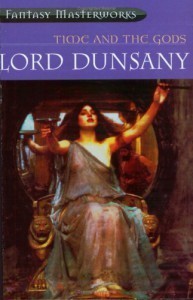 Bill Ward and I are continuing our Lord Dunsany re-read with the next two stories published in the original Time and the Gods (not the omnibus). You can find a free copy of the book here and join in the discussion. Our rating system is pretty simple. One star is a standout, and two stars is truly notable. Most of Lord Dunsany’s fantasy work is already fairly remarkable, so even a “no star” story on this scale may be worth a look. This week we read “Mlideen” and “Secret of the Gods.”
Bill Ward and I are continuing our Lord Dunsany re-read with the next two stories published in the original Time and the Gods (not the omnibus). You can find a free copy of the book here and join in the discussion. Our rating system is pretty simple. One star is a standout, and two stars is truly notable. Most of Lord Dunsany’s fantasy work is already fairly remarkable, so even a “no star” story on this scale may be worth a look. This week we read “Mlideen” and “Secret of the Gods.”
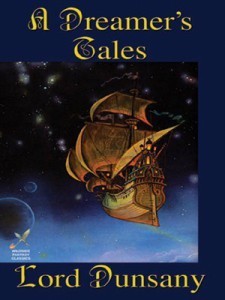 Howard: Maybe it’s just me, but I keep finding myself thinking like an editor when I read these. As we continue, I pick out which ones I’d put into a “best of” Lord Dunsany collection.
Howard: Maybe it’s just me, but I keep finding myself thinking like an editor when I read these. As we continue, I pick out which ones I’d put into a “best of” Lord Dunsany collection.
I don’t think either of these would make the cut. It’s not that there aren’t some great turns of phrase or nice little concepts, but both of these felt slight to me.
“Mlideen” is my favorite of the two what with man constantly readying disasters for himself. And I do like Uldoon’s vision of the gods mourning a death from “Secret of the Gods.” The end, however, is telegraphed from the first line.
What’s your take, Bill? Am I just too jaded? Is there something I’m not celebrating enough this week?
Bill: I enjoyed both stories, but I concur, they weren’t the highlight of my week. I really think it comes back to knowing I need to write about each one — aside from giving a book report, I’m not sure what more there is to say. Both are quick, “Mlideen” especially, with punch endings.
 I would also say “Mlideen” is my favorite of the two. It’s a short, sharp little story. The gods holding this avalanche “in leash” over the city while it commits blasphemies is a great image. I didn’t really understand the purpose of the narration becoming first person at the end, unless it was to show that, even with full knowledge of impending disaster, people are going to do what they are going to do anyway.
I would also say “Mlideen” is my favorite of the two. It’s a short, sharp little story. The gods holding this avalanche “in leash” over the city while it commits blasphemies is a great image. I didn’t really understand the purpose of the narration becoming first person at the end, unless it was to show that, even with full knowledge of impending disaster, people are going to do what they are going to do anyway.
Howard: Even though that last line broke the third person narrative, the story rose just a few degrees in estimation for me because of it, and for the reason you cite.
Bill: The “Secret of the Gods” has another nice line: how, in the beginning, the Secret was obvious, it was written on the earth before “the feet of many prophets … trampled it out.” Zyni Moe killing the prophet before he could tell the secrets of the god’s grief was effective, and I thought it was interesting he saw “the shadow” of the man much in the same way the man saw the shadow of the gods.

Lord Dunsany
Howard: Great point on the shadow — I had missed the parallel there.
Bill: Overall, though, I think these stories are just fine in the context of the larger theme of the collection, the writing of course being fantastic; it’s just that I think you and I would love to have something to gush about every week, and it just isn’t going to happen with a collection of 20 or more stories, many of which are based around a single idea.
Howard: I suppose you’re right. We’re getting near the end of the collection. Next week join us for the next two tales…
February 4, 2015
Off and On
Today’s episode of Sesame Street is brought to you by the number 3 and the letter P.
Now here’s a special guest star to talk about OFF and ON!

Stupid fuzzy monsterses told Smeagol to talk about OFF and ON.

The precious is ON the master.
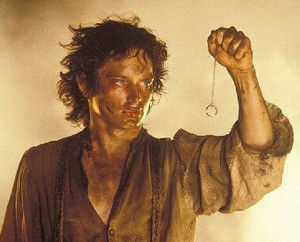
The precious is OFF the master.
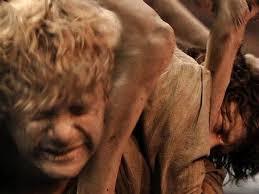
Smeagol is ON the stupid fat hobbit.

Smeagol bites OFF Master’s finger!
January 30, 2015
Lord Dunsany Re-Read: Time and the Gods, Part 6
 Bill Ward and I are continuing our Lord Dunsany re-read with the next two stories published in the original Time and the Gods (not the omnibus). You can find a free copy of the book here and join in the discussion. Our rating system is pretty simple. One star is a standout, and two stars is truly notable. Most of Lord Dunsany’s fantasy work is already fairly remarkable, so even a “no star” story on this scale may be worth a look. This week we read “Night and Morning” and “Usury.”
Bill Ward and I are continuing our Lord Dunsany re-read with the next two stories published in the original Time and the Gods (not the omnibus). You can find a free copy of the book here and join in the discussion. Our rating system is pretty simple. One star is a standout, and two stars is truly notable. Most of Lord Dunsany’s fantasy work is already fairly remarkable, so even a “no star” story on this scale may be worth a look. This week we read “Night and Morning” and “Usury.”
 Howard: These two were a delight. The last two, fine as they were, felt a little like drudgery. These two reminded me of why Lord Dunsany’s prose is beloved.
Howard: These two were a delight. The last two, fine as they were, felt a little like drudgery. These two reminded me of why Lord Dunsany’s prose is beloved.
“Night and Morning” is a simple mythological tale executed by a genius, a discussion between the anthropomorphic depiction of Night and Morning. Short and sweet, it drips with story potentialities. Lord Dunsany tosses out scene after fascinating scene (or story sketch) with the ease of, say, Neil Gaiman. I loved it. Two stars from me for this one.
“Usury” is another look at a God, although it’s clear from the few introductory lines that it may simply be a tale that men tell (as the stories in this collection progress we seem to creep further and further from the idea that the gods are real). The story’s a fascinating and inventive way to look at how souls come to Earth and sounds very much like an explanation for life and death that some culture might have devised, except that some culture didn’t, Lord Dunsany did. It wasn’t quite as compelling as “Night and Morning,” although it was just as brilliant, so I award it one star. What was your take, Bill?
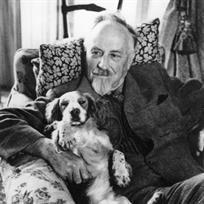 Bill: I agree, Howard, these two were great. I also share your star ratings.
Bill: I agree, Howard, these two were great. I also share your star ratings.
“Night and Morning” reminds me of all those things I like best about Dunsany, the language, the wonderful fantasy names, the myth and metaphor, and the infinite variety of creative invention. As you say, he tosses these great little vignettes off in a way that suggests a universe much larger than what we are necessarily seeing. I love this technique, it achieves a kind of density of the wondrous, his imagination is simply exhilarating. And the changing of allegiance from Night to Morning as the sun rises is a great extended metaphor.
“Usury” does indeed feel like it’s the idea of godhood from some other culture, but of course it’s all original to Mr. Plunkett. And another great piece of invention it is, a greedy god who hordes men’s souls, who lends out each as a gem to be polished over time — but taken back once they’ve improved in value through living. Men of course soon get the idea that their souls should be their own, but Yahn’s power over them is complete.
My kindle tells me we are now at the halfway mark in Time and the Gods, and it’s been a great collection so far!
Howard: Join us next week for a look at “Mlideen” and “The Secret of the Gods.”
January 28, 2015
Parallel Stories
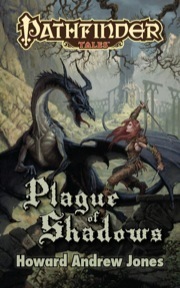 I first experimented with parallel story structure when I wrote Plague of Shadows for Paizo’s Pathfinder series. In that book, I’d occasionally flash back in time fifteen years for vignettes that slowly revealed background relationships illuminating why the characters acted toward each other the way they did in the present.
I first experimented with parallel story structure when I wrote Plague of Shadows for Paizo’s Pathfinder series. In that book, I’d occasionally flash back in time fifteen years for vignettes that slowly revealed background relationships illuminating why the characters acted toward each other the way they did in the present.
It wasn’t a NEW technique, for I’ve seen it done elsewhere, and you probably have as well (especially in Scott Lynch’s Gentleman Bastard books). But it was new to me.
In my new series I’m attempting to use it in a far more complex manner, for approximately half of each book (thought not all in one chunk). Characters who are dead or missing in the present are point of view characters in the past, and they are searching for explanation of mysteries that we see characters in the present discovering (all while dealing with the aftermath of actions taken by both themselves and these other POV characters long ago).
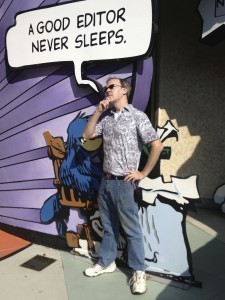 I switch back and forth between the past and present — part one is in the present, part two in the past, part three in the present, etc. It’s tricky. I don’t think I’ve ever had so many balls in the air at once. I’m striving for some very subtle effects. For instance, one small way I’m trying to ratchet tension is by the reader knowing that one (hopefully interesting) character will die a day after she’s promoted, and that promotion gets closer and closer as we get to know her better. And then, the day when she’s supposed to be promoted, she’s injured and can’t attend the ceremony — how much longer DOES she have? I’m hopeful that will create tension.
I switch back and forth between the past and present — part one is in the present, part two in the past, part three in the present, etc. It’s tricky. I don’t think I’ve ever had so many balls in the air at once. I’m striving for some very subtle effects. For instance, one small way I’m trying to ratchet tension is by the reader knowing that one (hopefully interesting) character will die a day after she’s promoted, and that promotion gets closer and closer as we get to know her better. And then, the day when she’s supposed to be promoted, she’s injured and can’t attend the ceremony — how much longer DOES she have? I’m hopeful that will create tension.
I’ve also set up rules for myself. For instance, I don’t use anyone as a point of view character until they’ve been either introduced through the eyes of a POV character, or discussed by them several times. Obviously the first POV character is new to readers, but after him there should only be reactions along the lines of “Oh, I’ve met this character; it will be interesting to see what he or she is like” or, hopefully, “cool — they’ve been talking about this person from the past and now I get to see why they thought she was so interesting/deadly/competent.”
Right now almost all of my creative energy is focused upon revision of the first book, so I’m tightening the through lines, cutting dialogue and sharpening prose. I can’t be sure it’s all working, but I’m enjoying it, and in my experience that’s always a good sign.
Howard Andrew Jones's Blog
- Howard Andrew Jones's profile
- 368 followers




